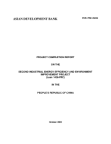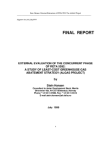The coastal areas of Bangladesh are prone to severe damage from cyclones. In 1991, a devastating cyclone with winds exceeding 200 kilometers (km) per hour and a tidal surge of 6 meters (m) struck Bangladesh.
ADB
Second Industrial Energy Efficiency and Environment Improvement Project in China (2005)
The Project focused on three major groups of energy-intensive industries-chemical, cement, and iron and steel industries-and five subprojects to achieve demonstration effects while supporting compliance with prevailing environmental standards.
India - Renewable Energy Development Project
Indian Renewable Energy Development Agency Limited (IREDA) was incorporated in March 1987, under the Companies Act, 1956, as a specialized financial institution, wholly owned by the Government, primarily for promoting, developing, and financing new and renewable sources of energy (NRSE) technolog
Nepal - Kali Gandaki I A Hydroelectric Project
Hydroelectric power provides most of the electricity in Nepal. The Government's energy policy has focused on developing the country's large, economically exploitable hydropower potential as a renewable source of energy for domestic use and for exports.
Second Industrial Energy Efficiency and Environmental Improvement Project China
This project was designed to promote sustainable improvements in energy efficiency in China's industrial sector and create substantial environmental benefits.
Mongolia - Energy Conservation Project
The Project's strategic objectives were to meet the basic needs of the population and support economic recovery; and promote sec tor efficiency.
India - Industrial Energy Efficiency
In December 1994, the Asian Development Bank (ADB) approved the Industrial Energy Efficiency Project (IEEP) to promote energy efficiency in Indian industry, consistent with ongoing market-oriented reforms in the country.The Project was intended to support financially viable investments leading to
A Study of Least-Cost Greenhouse Gas Abatement Strategy (Algas Project)
The Asia Least-Cost Greenhouse Gas Abatement Strategy (ALGAS) is aimed at enhancing existing national and regional capabilities to develop least-cost greenhouse gas abatement strategies that promote environmentally sustainable economic development in 12 Asian countries.










